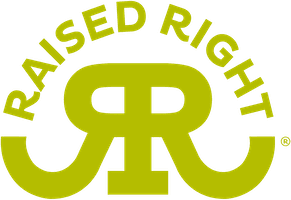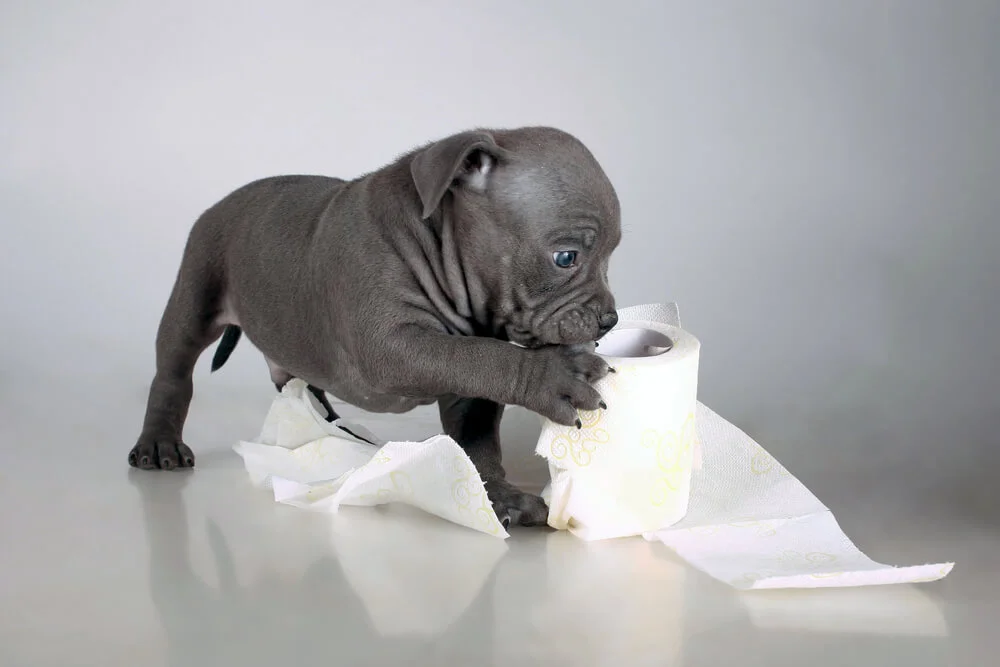
Diarrhea is a common complaint in our canine friends. It can be a once-off episode of diarrhea or a more chronic issue that has been going on for days. Many causes of diarrhea are due to changes in diet or dogs eating something they shouldn’t but some cases can be due to a more serious disease. We’ll discuss the common symptoms, causes, and treatments now.
Symptoms of Diarrhea in Dogs
Diarrhea symptoms can vary depending on how severe the diarrhea is and what is causing it. It can occur during the day, at night, or after eating. For example, a mild case of diarrhea from a change of diet might include symptoms such as;
- Loose feces
- Trace of mucous in feces
- Trace of fresh blood in the feces
- Gas
In most cases of mild diarrhea, the dog’s appetite shouldn’t be affected and they should be drinking normally. They might drink a little bit more due to water loss from the diarrhea. They should still be bright, alert, and have energy.
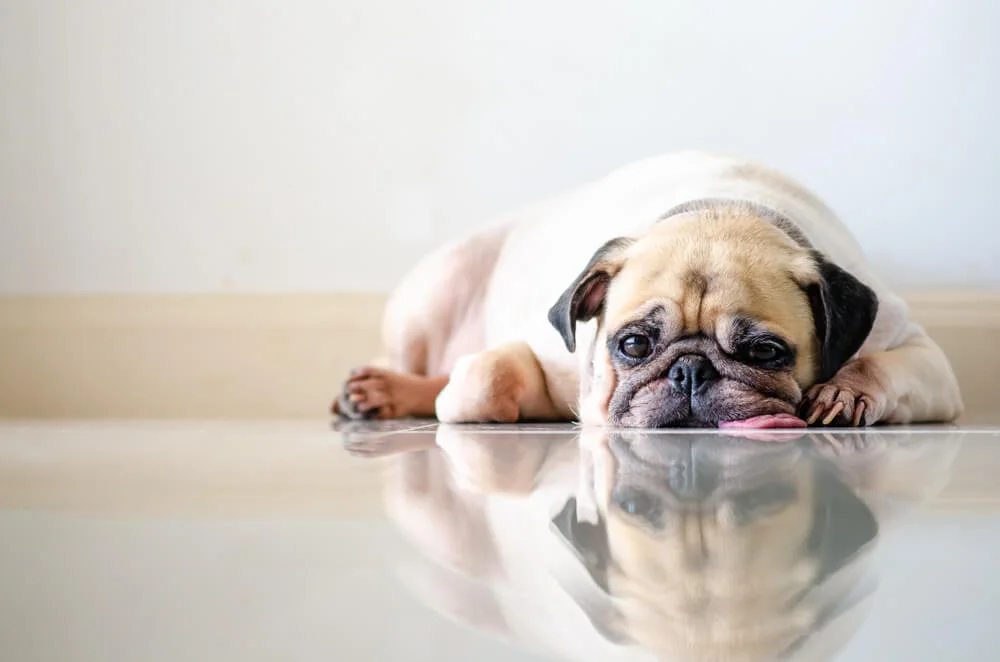
Lethargy could be one of the symptoms of a more serious diarrhea.
In more serious cases of diarrhea, the symptoms can be varied and severe. This diarrhea could be due to conditions such as inflammatory bowel disease or kidney disease. It can include the symptoms above and also the symptoms below;
- Loose or watery feces
- Presence of dark blood in feces (melena) or large amounts of fresh blood (hematochezia)
- Gurgling from tummy
- Vomiting
- Lethargy
- Reduced or lack of appetite
- Reduced or increased drinking
- Painful tummy
- Weight loss
Diarrhea itself can also give a hint as to where the problem is in the intestines. Diarrhea symptoms can be split into small intestinal, large intestinal, or a mixture of both.
Small intestinal diarrhea usually has symptoms such as;
- Increase in feces volume
- Presence of dark blood
- Weight loss
- Increased frequency of defecating
Large intestinal diarrhea can have symptoms such as;
- Presence of mucous
- Presence of fresh red blood
- Decreased volume of feces
- Increased frequency of defecating
- Straining to defecate
What Causes Diarrhea in Dogs
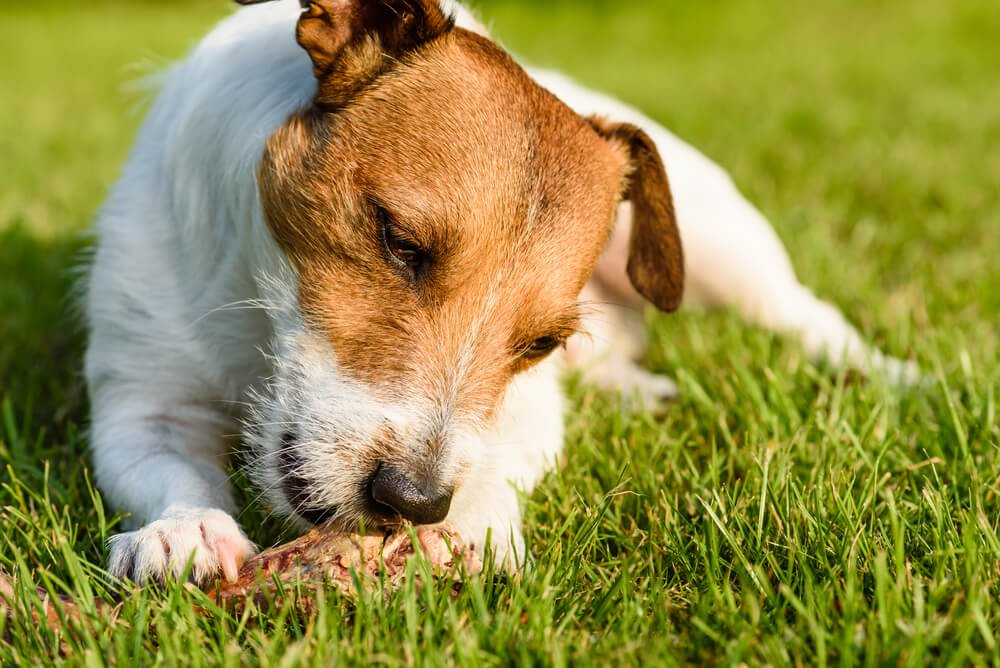
Food-related issues, such as food allergies, dietary changes as well as injecting a foreign body e.g. eating plastic are all common causes of diarrhea in dogs.
There are many causes of diarrhea in dogs. We can split this into two categories; causes in the gastrointestinal tract and causes outside of the gastrointestinal tract. Causes in the gastrointestinal tract are directly related to the gut and include things like; parasites, inflammatory bowel disease, or a foreign body. Causes outside of the gut can include any disease that is affecting the bowel like kidney disease or diabetes mellitus.
Most cases of sudden, mild diarrhea in dogs are caused by the dog’s diet. They may have eaten some table scraps, had a change in diet or they might be eating a poor-quality diet. Their tummies can be quite sensitive so if they have diarrhea you should look at what they’re eating. This is a very common problem when it comes to doggie diarrhea!
Common causes of diarrhea in dogs include;
- Diet change
- Dietary indiscretion e.g. eating garbage
- Stress e.g. a puppy going to their new home
- Food sensitivity/allergies
- Parasites e.g. giardia
- Bacterial infection
- Viral infection e.g. parvovirus in puppies
- Toxins/poisons e.g. chocolate
- Foreign body e.g. eating plastic
- Inflammatory bowel disease
- Bacterial overgrowth
- Cancer
- Kidney disease
- Liver disease
- Diabetes mellitus
There are numerous causes of diarrhea and some are more common at certain stages of life. For example, a puppy is more likely to have parasites while an older dog is more likely to have an underlying disease. The symptoms are also quite important to determining the cause, mild symptoms might be more indicative of a dietary indiscretion while severe symptoms could make a foreign body or underlying disease more likely.
Home Remedies for Diarrhea in Dogs
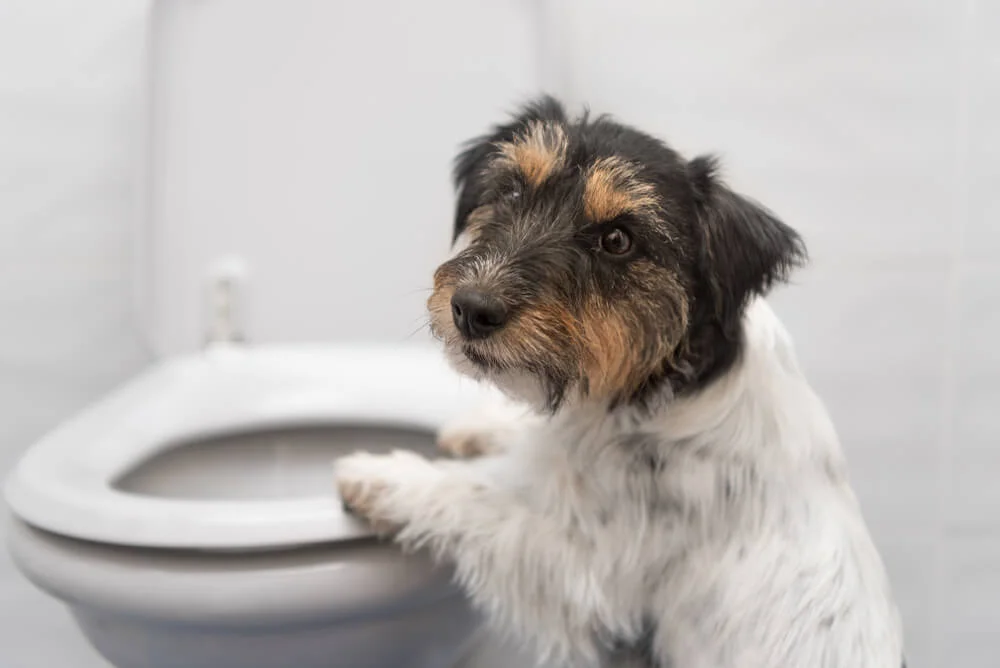
You can try to prevent diarrhea by making new diet changes gradually, avoid leaving out leftover food or sharp objects, and keeping your dog healthy.
If your dog has mild diarrhea, there are some remedies that you can try at home. First of all, make sure that they stay hydrated and drink regularly as dehydration is a common issue with diarrhea. Probiotics can help dogs with diarrhea by introducing good bacteria into the gut. Good bacteria can often be destroyed by bacterial infections and viruses. They are readily available from most veterinary clinics and reputable pet stores. They usually come in the form of a paste or powder. If your dog is displaying other symptoms such as vomiting, lethargy, or lack of appetite you should see your veterinarian.
You can try to prevent diarrhea by making new diet changes gradually, avoid leaving out leftover food or sharp objects, and keeping your dog healthy. This involves keeping their vaccinations and parasite treatment up to date. They should be fed a complete & balanced diet with high-quality ingredients. Feeding a nutritionally balanced food with a limited ingredient list can help with food allergies as it’s less likely to aggravate allergies and it’s also a lot easier to rule out foods that they could be allergic to.
Feeding a diet that doesn’t have unnecessary ingredients such as preservatives and high carb fillers will help to prevent obesity. Obesity can cause many other health issues and cause chronic inflammation which is the root of almost all chronic diseases.
Veterinary Treatment for Diarrhea in Dogs
Many cases of mild diarrhea will resolve by itself or with treatment. For cases of moderate-severe diarrhea though, these will often need treatment from a veterinarian. If your vet is worried about parasites they might collect a fecal sample to analyze or if they’re worried about kidney disease or diabetes they’ll do some bloodwork. They might recommend a food trial with a limited ingredient diet for 6 weeks to treat food allergies.
Conclusion
Diarrhea is a common symptom in dogs and its causes are varied. Many cases are due to diet and can be treated at home by feeding a limited ingredient diet and probiotics. Ensuring that your dog is on a high-quality diet and at a correct weight can prevent many issues. If your dog’s diarrhea is severe or not resolving, you should visit your veterinarian.
Frequently Asked Questions
What can I give my dog to stop diarrhea?
For mild diarrhea, you can feed them a bland diet and give them probiotics.
When should I be concerned about my dog’s diarrhea?
If your dog is lethargic, vomiting, not eating, or has blood in their diarrhea then you should visit your veterinarian.
Why is my dog pooping liquid poop?
This can occur for many reasons including dietary indiscretion, parasites, and inflammatory bowel disease. You should contact your veterinarian if your dog is passing liquid poop.
What foods cause diarrhea in dogs?
Human leftovers, new diets, and poor-quality dog food can cause diarrhea in dogs. Avoid toxic foods such as chocolate, garlic, and onions.
